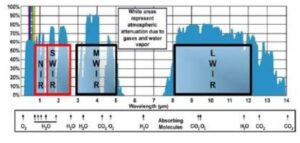Short-wave Infrared imaging (SWIR) is a method for producing high-quality images using radiation from the invisible region of the electromagnetic range.

What is SWIR Imaging?
The MWIR/LWIR spectral band will detect thermal emissions of all objects above absolute zero (0K), allowing thermographic cameras the ability to produce images based on temperature variations in a specific area. The short-wave infrared imaging (SWIR), which is more visible, is a special case. It allows for temperature measurement above 100 degrees C.
This article will examine some of the fundamental principles and applications SWIR imaging and show how SWIR cameras have taken up a unique spectroscopic market niche in the industrial and scientific sectors.
SWIR Imaging Basics: Understanding SWIR Imaging
The IR spectrum extends between the red end of the visible light spectrum and a range of wavelengths of 700 to 1,000,000 nanometres. There are four distinct waves within that spectrum: near-infrared, SWIR, MIR and LWIR. The way objects emit and reflect IR light is indicative of their physicochemical properties. For instance, materials exhibit characteristic SWIR absorption/reflection characteristics based on their distinct chemistries, enabling SWIR imaging to detect specific materials remotely.
SWIR imaging, unlike MWIR/LWIR does not rely upon the intrinsic emissivity (or heat) of objects. It is therefore not usually referred to as thermal energy. SWIR imaging is not affected by the ambient conditions that make visible light-based lenses unsuitable. These properties are being increasingly exploited by a broad market using cameras based upon cooled InGaAs focal plane arrays. SWIR is the portion of IR adjacent to NIR and occupies a nominal wavelength of 1,400 – 3,000 nm. These wavelength ranges are approximate, as there isn’t a standard for where each band separates. SWIR is sometimes classified as a band that extends the NIR.
InGaAs cameras are made up of an epitaxy-grown InGaAs bump that is bonded to a 2D readout integrated chip (ROIC). InGaAs is able to absorb IR light that silicon cannot see due to its wider bandgap. The ROIC and camera electronics then convert the incident light to electrons. InGaAs has a higher dark current than silicon-based devices. In order to improve low-light capabilities and reduce dark noise, cooling is essential for InGaAs focal plan arrays.
Key Applications of SWIR Imaging
SWIR imaging with cooled InGaAs focal plane arrays offers unprecedented resolution with extremely high contrast, allowing researchers and process engineers to visualize what was previously invisible. Using a SWIR camera, it is easy to distinguish between regions that are chromatically similar or to penetrate opaque materials non-invasively. A short selection of application of SWIR imaging include:
- Astronomy
- Active imaging
- Enhanced vision assistance in misty conditions
- Free space optical communication
- Hyperspectral imaging
- Industrial sorting
- Laser beam profiling
- Small animal imaging
- Solar cell inspection
- Spectroscopy
- Range finding
SWIR Imaging with Photonics Science
Photonics Science is one of the industry-leading manufacturers and suppliers of high-precision SWIR cameras for research and production-scale applications alike. Our tailored product range offers the best-in-class all-round performance for SWIR imaging applications. These include:
- Cooled VGA SWIR InGaAs Camera
- Cooled qVGA SWIR InGaAs Camera
- Cooled VGA SWIR InGaAs OEM Module
If you would like to learn more about our robust SWIR imaging product range, simply contact a member of the Photonics Science team today.
Related Posts
Capturing the Unseen: Exploring the SWIR Fixed Focal Length Lenses
How useful was this post? Click on a star to rate it! Submit Rating As you found this post useful......
What is SWIR Light?
How useful was this post? Click on a star to rate it! Submit Rating As you found this post useful......




